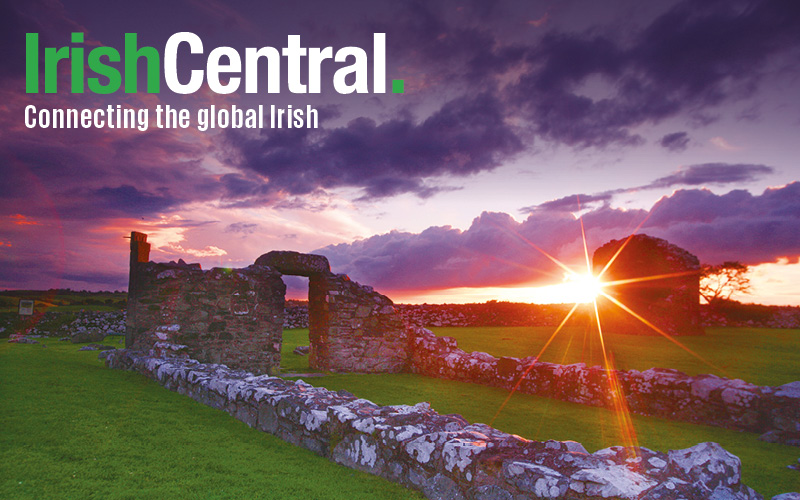My father was from a small town in County Mayo called Bangor Erris; my mother’s family hailed from Donegal. They met when they were both living in England, where I was born. Despite having been brought up in an Irish household, I always saw myself as English. After all, I was born in England and I went to school in England.
One Sunday afternoon, my dad arrived home from the pub slightly worse for wear. For some reason, he patted me on my 10-year-old head and said: “Never forget, son, that you are Irish.” No, Dad, I replied, I’m English. “No,” he insisted, “you are Irish!” But Dad, I remonstrated, I was born in England. “Ah,” he said, swaying slightly, “But if a dog’s born in stable, it doesn’t make it a horse.” I could not argue with his logic. Okay, I thought to myself, I’m Irish.
Despite my new-found nationality, I did not set foot on the Emerald Isle until I was in my early twenties. I don’t know why, but despite having relatives still living there, my two sisters and I were never taken across the Irish Sea for childhood holidays. The nearest we came to an Irish get-together were holidays in Scotland where my grandparents had emigrated to, along with four of my dad’s seven siblings.
In fact, it was my older sister and I who took dad home to Ireland as a 60th birthday present. He had been away for more than 40 years.
My sister and my Dad flew from London to Dublin. I took a coach from London to Holyhead in Wales, and a ferry across the Irish Sea to the port of Dún Laoghaire. We met up at Dublin Airport, hired a car and drove west.
There were signposts to Bangor Erris but there was no sign as you entered the town. Dad thought he recognized the street we were driving down so I pulled over. There was an elderly gentleman wearing what is known in those parts as a donkey jacket and a flat cap, leaning on a bike staring at us. Dad got out of the car and approached him. He asked him if this was Bangor Erris. “Sure, it is,” he replied, “and you’d be Seamus Shevlin. We were at school together!” He looked at least 20 years older than my father but I suppose that a lifetime of working outdoors with a bracing wind coming off of the Atlantic Ocean would eventually have taken its toll.
The next minute, we were in the nearest pub. We were introduced to the owner of the bar, who was the son of the schoolteacher who taught my dad, and his long-lost friend named Pardraic.
Within minutes the bar was packed. It seems that one of their own coming home was a cause for celebration. People were coming up to my father, explaining who they were and welcoming him home. Each time, my dad turned to me and said: “Get them a drink.” I remember that afternoon costing me an absolute fortune.
I met a man who said he remembered my grandmother’s wedding, adding that her dowry was two goats. I couldn’t think of a thing to say. This is not a problem in Ireland. “She was a fine catch, was Katie.” Whether this was because of the goats or not, he didn’t say.
I was chatting to one elderly lady, who seemed to know more about my extended family than I did. She knew where so-and-so had emigrated to, who they had married, and the names of any children. And, thanks to an institution on Irish radio called the ‘death notices,’ whether they were still alive or not. All of this was long before the likes of Google, Facebook and Ancestry.com.
She knew that dad had met mum in England and had three kids. The lady asked if my younger sister was home. She was indeed back in England with my mother so I said, yes she was. “Then, where is she?” the lady enquired. She’s home, I said. She looked around the bar. “I don’t see her.” I was about to say, that that was because she’s not here, she’s at home. Clearly, I had left too long a gap in the conversation and she filled it with another question. “And how long are you home for?” But I’m not at home, I thought, I’m here! And then it dawned on me. Home was Ireland. I had come home.
And it did feel like home. I looked around me. It all felt so familiar. The easy, relaxed attitude and gentle banter. The melodious accents on well-worn phrases and laughter were sounds I knew so well from the family get-togethers of my childhood.
It was as if the missing piece in my DNA puzzle had been put in place.
We went home to Ireland the following year – my younger sister and my mum came too. I have been back many times since. When I took my own children there, I told them that this is where they are from. I told them that they were home.
I travel all over the world as a musician and people ask me, “Are you English?” No, I reply. I’m Irish. And the farther away from Ireland I travel, the more Irish I seem to become. In Nashville, I even wrote a song called Restless Celtic Heart which is dedicated to all the Irish that left their homeland in search of a better life.
Recently, I applied for, and was granted, Irish Citizenship. When the certificate arrived, I was strangely unmoved by it. I realized that I didn’t need a piece of paper to tell me what I felt in my heart.
This article was submitted to the IrishCentral contributors network by a member of the global Irish community. To become an IrishCentral contributor click here.




Comments